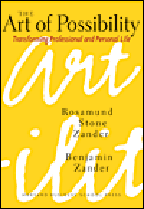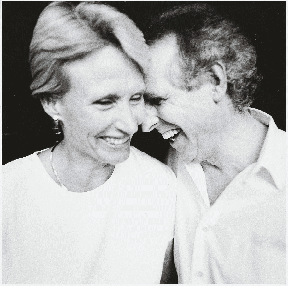|
| ||
 |
A Business Forum Book Review: Transforming Professional and Personal Life by Rosamund Stone Zander and Benjamin Zander | >

ike a piece of music, this book has a long song line, a theme upon which each chapter is a variation. The long line portrays a world where the conflict between the individual and the collective that is intrinsic to our everyday reality resolves. In this vision, an individual's unique expression plays an integral and constructive part in setting a direction for the group — in fact, for all of humankind. The long line is the possibility of seeing deeply into what is best for all of us, seeing the next step."
"L The Zanders have collaborated in writing an exceptional how-to book. "Unlike the genre of how-to books that offer strategies to surmount the hurdles of a competitive world and move out ahead, the objective of this book is to provide the reader the means to lift off from that world of struggle and sail into a vast universe of possibility. Our premise is that many of the circumstances that seem to block us in our daily lives may only appear to do so based on a framework of assumptions we carry with us. Draw a different frame around the same set of circumstances and new pathways come into view. Find the right framework and extraordinary accomplishment becomes an everyday experience."
This is the vision for The Art of Possibility: Transforming Professional and Personal Life by Rosamund Stone Zander and Benjamin Zander (Harvard Business School Press, 224 pages, $22.50). Benjamin Zander is the beloved and respected founder and conductor of the Boston Philharmonic Orchestra and a professor at the New England Conservatory of Music. Rosamund Stone Zander is a family therapist and a landscape painter. Each of the book's twelve chapters develop a specific practice for achieving the Zanders' vision — for bringing possibility to life. "Each practice provides an opportunity for personal evolution that promises to enhance not only the reader's life but also the organizations and relationships in which he or she participates. These practices are as relevant to corporate management as they are to a marriage; as relevant to acts of diplomacy as to the settlement of family disputes."
1. It's All Invented
2. Stepping into a Universe of Possibility
3. Giving an A
4. Being a Contribution
5. Leading from Any Chair
6. Rule Number 67. The Way Things Are
8. Giving Way to Passion
9. Lighting a Spark
10. Being a Board
11. Creating Frameworks for Possibility
12. Telling the WE Story
Benjamin Zander presents a remarkable insight in Chapter 5, Leading from Any Chair: "I had been conducting for nearly twenty years when it suddenly dawned on me that the conductor of an orchestra does not make a sound. His picture may appear on the cover of the CD in various dramatic poses, but his true power derives from his ability to make other people powerful. I began to ask myself questions like — 'What makes a group lively and engaged?' — instead of 'How good am I?'""A monumental question for leaders in any organization to consider is: How much greatness are we willing to grant people? Because it makes all the difference at every level who it is we decide we are leading. The activity of leadership is not limited to conductors, presidents, and CEOs, of course — the player who energizes the orchestra by communicating his newfound appreciation for the tasks of the conductor, or a parent who fashions in her own mind that her children desire to contribute, is exercising leadership of the most profound kind."
Rosamund Stone Zander emphasizes, "Today's leader's job is to create a powerful vision that allows room for things to occur that are yet undreamed of. The leader must hold the definition of the vision so clearly that all the players involved are able to align with it daily." Further, "Abstractions that we unwittingly treat as physical reality tend to block us from seeing the way things are, and therefore reduce our power to accomplish what we say we want." "Possibility has its own music, its own gestures, its own kind of radiance ... How could we help but be joyous that we had the means among us to make everything work?"
Incidentally, Rule Number 6, the caption of Chapter 6, is "Don't take yourself so goddamn seriously."
With their contrapuntal voices sensitively interwoven, the Zanders guide us on a journey overthrowing the familiar assumptions in which we are entrapped to see and grasp the uncommon possibilities surrounding us. They offer new ways of looking at the puzzles leaders and managers commonly face with pathways to surmounting these impediments and living our lives fully. One person's transformation radiates outward to others in exceptional, non-linear and often unfathomable ways.
"The practice of framing possibility calls upon us to use our minds in a manner that is counterintuitive: to think in terms of the contexts that govern us rather than the evidence we see before our eyes. It trains us to be alert to a new danger that threatens modern life — the danger that unseen definitions, assumptions, and frameworks may be covertly chaining us to the downward spiral and shaping conditions we want to change.
"But look what magical powers we have! We can make a conscious use of our way with words to define new frameworks for possibility that bring out the part of us that is most contributory, most unencumbered, most open to participation. And why not say that is who we really are?"
Your comments and suggestions for these pages are most welcomed!
|
Thomas A. Faulhaber, Editor
Email: editor@businessforum.com Brookline, Massachusetts 02446.2822 USA |
URL: http://www.businessforum.com/zander.html
Revised: October 5, 2000 TAF
© Copyright 2000 Thomas A. Faulhaber / The Business Forum Online®, All Rights Reserved